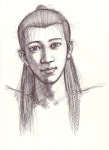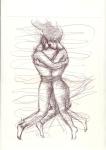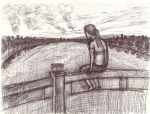The animation is inspired by the narrative of the ancient song with rich historical contexts, yet it is not only bonded with the original story, but reflects on the tragical consequences with a broad cultural background.
The anonymous ballad “Southeast Fly the Peacocks,” also titled “Chiao Chung-ching’s Wife(焦仲卿妻),” is one of the most remarkable poems in the Chinese language. It is the longest narrative poem prior to the Tun-huang ballads of the Tang Dynasty. It is unique among the early yue-fu poems in its elaborate narration, composed with great literary skill. The domestic tragedy it relates has moved readers through the ages and it of great interest from the viewpoints of literary history, social history, and social psychology.
– Hans H. Frankel, The Chinese Ballad “Southeast Fly the Peacocks.” Harvard Journal of Asiatic Studies, Vol. 34, (1974), pp. 248-271. Published by: Harvard-Yenching Institute <http://www.jstor.org/pss/2718702>






One reply on “Southeast Fly the Peacocks (孔雀东南飞)”
For viewing Guzheng performance:
Full text [1]:
孔雀东南飞
五里一徘徊
十三能织素
十四学裁衣
十五弹箜篌
十六诵诗书
十七为君妇
心中常苦悲
君既为府吏
守节情不移
贱妾留空房
相见常日稀
鸡鸣入机织
夜夜不得息
三日断五疋
大人故嫌迟
非为织作迟
君家妇难为
妾不堪驱使
徒留无所施
便可白公姥
及时相遣归
府吏得闻之
堂上启阿母
儿已薄禄相
幸复得此妇
结发同枕席
黄泉共为友
共事二三年
始而未为久
女行无偏斜
何意致不厚
阿母谓府吏
何乃太区区
此妇无礼节
举动自专由
吾意久怀忿
汝岂得自由
东家有贤女
自名秦罗敷
可怜体无比
阿母为汝求
便可速遣之
遣去慎莫留
府吏长跪告
伏惟启阿母
今若遣此妇
终老不复娶
阿母得闻之
槌床便大怒
小子无所畏
何敢助妇语
吾已失恩意
会不相从许
府吏默无声
再拜还入户
举言谓新妇
哽咽不能语
我自不驱卿
逼迫有阿母
卿但暂还家
吾今且报府
不久当归还
还必相迎取
以此下心意
慎勿违我语
新妇谓府吏
勿复重纷纭
往昔初阳岁
谢家来贵门
奉事循公姥
进止敢自专
昼夜勤作息
伶俜萦苦辛
谓言无罪过
供养卒大恩
仍更被驱遣
何言复来还
妾有绣腰襦
葳蕤自生光
红罗复斗帐
四角垂香囊
箱帘六七十
绿碧青丝绳
物物各具异
种种在其中
人贱物亦鄙
不足迎后人
留待作遣施
于今无会因
时时为安慰
久久莫相忘
鸡鸣外欲曙
新妇起严妆
著我绣夹裙
事事四五通
足下蹑丝履
头上玳瑁光
腰若流纨素
耳著明月当
指如削葱根
口如含珠丹
纤纤作细步
精妙世无双
上堂谢阿母
母听怒不止
昔作女儿时
生小出野里
本自无教训
兼愧贵家子
受母钱币多
不堪母驱使
今日还家去
念母劳家里
却与小姑别
泪落连珠子
新妇初来时
小姑始扶床
今日被驱遣
小姑如我长
勤心养公姥
好自相扶将
初七及下九
嬉戏莫相忘
出门登车去
涕落百余行
府吏马在前
新妇车在后
隐隐何甸甸
俱会大通口
下马入车中
低头共耳语
誓不相隔卿
且暂还家去
吾今且赴府
不久当还归
誓天不相负
新妇谓府吏
感君区区怀
君既若见录
不久望君来
君当作磐石
妾当作蒲苇
蒲苇韧如丝
磐石无转移
我有亲父兄
性行暴如雷
恐不任我意
逆以煎我怀
举手长劳劳
二情同依依
入门上家堂
进退无颜仪
阿母大拊掌
不图子自归
十三教汝织
十四能裁衣
十五弹箜篌
十六知礼仪
十七遣汝嫁
谓言无誓违
汝今何罪过
不迎而自归
兰芝怼阿母
儿实无罪过
阿母大悲摧
还家十余日
县令遣媒来
云有第三郎
窈窕世无双
年始十八九
便言多令才
阿母谓阿女
汝可去应之
阿女含泪答
兰芝初还时
府吏见叮咛
结誓不别离
今日违情义
恐此事非奇
自可断来信
徐徐更谓之
阿母白媒人
贫贱有此女
始适还家门
不堪吏人妇
岂合令郎君
幸可广问讯
不得便相许
媒人去数日
寻遣丞请还
说有兰家女
丞籍有宦官
云有第五郎
娇逸未有婚
遣丞为媒人
主簿通语言
直说太守家
有此令郎君
既欲结大义
故遣来贵门
阿母谢媒人
女子先有誓
老姆岂敢言
阿兄得闻之
怅然心中烦
举言谓阿妹
作计何不量
先嫁得府吏
后嫁得郎君
否泰如天地
足以荣汝身
不嫁义郎体
其往欲何云
兰芝仰头答
理实如兄言
谢家事夫君
中道还兄门
处分适兄意
那得自任专
虽与府吏约
后会永无缘
登即相许和
便可作婚姻
媒人下床去
诺诺复尔尔
还部白府君
下官奉使命
言谈大有缘
府君得闻之
心中大欢喜
视历复开书
便利此月内
六合正相应
良吉三十日
今已二十七
卿可去成婚
交语速装束
络绎如浮云
青雀白鹄舫
四角龙子幡
婀娜随风转
金车玉作轮
踯躅青骢马
流苏金缕鞍
斋钱三百万
皆用青丝穿
杂采三百疋
交广市鲑珍
从人四五百
郁郁登郡门
阿母谓阿女
适得府君书
明日来迎汝
何不作衣裳
莫令事不举
阿女默无声
手巾掩口啼
泪落便如泻
移我琉璃榻
出置前厅下
左手持刀尺
右手执绫罗
朝成绣夹裙
晚成单罗衫
暗暗日欲暝
愁思出门啼
府吏闻此变
因求假暂归
未至二三里
摧藏马悲哀
新妇识马声
蹑履相逢迎
怅然遥相望
知是故人来
举手拍马鞍
嗟叹使心伤
自君别我后
人事不可量
果不如先愿
又非君所详
我有亲父母
逼迫兼弟兄
以我应他人
君还何所望
府吏谓新妇
贺君得高迁
磐石方且厚
可以卒千年
蒲苇一时韧
便作旦夕间
卿当日胜贵
吾独向黄泉
新妇谓府吏
何意出此言
同是被逼迫
君尔妾亦然
黄泉下相见
勿违今日言
执手分道去
各各还家门
生人作死别
恨恨那可论
念与世间辞
千万不复全
府吏还家去
上堂拜阿母
今日大风寒
寒风摧树木
严霜结庭兰
儿今日冥冥
令母在后单
故作不良计
勿复怨鬼神
命如南山石
四体康且直
阿母得闻之
零泪应声落
汝是大家子
仕宦于台阁
慎勿为妇死
贵贱情何薄
东家有贤女
窈窕艳城郭
阿母为汝求
便复在旦夕
府吏再拜还
长叹空房中
作计乃尔立
转头向户里
渐见愁煎迫
其日牛马嘶
新妇入青庐
奄奄黄昏后
寂寂人定初
我命绝今日
魂去尸长留
揽裙脱丝履
举身赴清池
府吏闻此事
心知长别离
徘徊庭树下
自挂东南枝
两家求合葬
合葬华山傍
东西植松柏
左右种梧桐
枝枝相覆盖
叶叶相交通
中有双飞鸟
自名为鸳鸯
仰头相向鸣
夜夜达五更
行人驻足听
寡妇起彷徨
多谢后世人
戒之慎勿忘
A pair of peacocks southeast fly;
At each mile they look back and cry.
“I could weave,” said Lan-zhi, “at thirteen
And learned to cut clothes at fourteen;
At fifteen to play music light;
At sixteen to read and to write.
At seventeen to you I was wed.
What an austere life I have led!
You’re an official far away;
I toil as housewife night and day.
At daybreak I begin to weave;
At night the loom I dare not leave.
I’ve finished five rolls in three days,
Yet I am blamed for my delays.
Not that my work is done too slow,
But hard your housewife’s role does grow.
If Mother thinks I am no good,
What use to stay, although I would?
Will you come and to Mother say,
Send me back home without delay?”
Jiao Zhong-qing came home at her call
And said to his mother in the hall,
“I’m destined for a humble life;
By fortune I have this good wife.
We’ve shared the pillow, mat and bed,
And we’ll be man and wife till dead.
We’ve lived together but three years,
Which not too long to me appears.
She has done nothing wrong, I find.
Why should you be to her unkind?”
His mother said then in reply,
“You are indeed shortsighted. Why,
This wife of yours with me goes ill;
She always does whate’er she will.
I’ve been offended by her for long.
How dare you say she’s done no wrong?
In the east there’s a match for you,
A maiden whose name’s Qin Luo-fu,
A peerless beauty of this land.
I’ll go for you to ask her hand.
Now send your slut out of our door!
She should not stay here anymore.”
Zhong-qing knelt down with trunk erect
And said to her with due respect,
“If you should send away my wife,
I won’t remarry all my life.”
The mother was angry at his word;
Her strumming on the stool was heard.
“Has filial reverence come to nil?
Defend your wife against my will!
You are such an ungrateful son!
Of your request I will grant none.”
Zhong-qing dared not speak anymore,
But bowed and entered his own door.
He tells his wife when she appears,
His voice choked so with bitter tears,
“Not that I would send you away,
But Mother won’t allow you to stay.
Return to your brother’s house, so
That to my office I may go.
When I have finished my work, then
I’ll come and fetch you home again.
Do not be grieved to say adieu,
But keep in mind what I’’ve told you!”
“Nay, make no care to come for me!”
To her husband addresses she.
“One early spring day, I recall,
I left home for your entrance hall.
I’ve done what Mother ordered me.
Dare I be careless and carefree?
I do hard labour day and night;
Alone I toil with all my might.
I think I have done nothing wrong,
Still with Mother I can’t get along.
To what avail to talk about
Returning now I’m driven out!
“I’ll leave my jacket of brocade,
Whose lacings bright of gold are made,
And my canopy of gauze red,
Whose four corners with perfume spread,
And sixty trunks and coffers tied
With silken threads all in green dyed,
Where different things you will find;
Not two of them are of a kind.
They are as cheap as I, it’s true,
Not good enough for your spouse new.
So as gifts you may share them out,
As we can’t meet again, no doubt.
Keep them in memory of me!
Forgetful we can never be.”
At dawn she roses at the cockcrow
And made up with care, ready to go.
She put on an embroidered gown
And checked it over, up and down.
She put on shoes made of brocade,
Of tortoise shell her hairpin’s made.
Her waist was girt with girdle white,
Her earrings shone like moonlight bright.
She had tapering finger tips,
Like rubies were her rouged lips.
She moved at slow and easy pace,
Unrivalled in the human race.
She came to his mother in the hall,
Who said no tender words at all.
“While young, before I was a spouse,
I lived but in a country house.
Not well instructed or wide read,
For noble heir I was ill-bred.
Though kindly you have treated me,
Yet I’m not dutiful,” said she,
“So I must go back in despair,
Leaving to you all household care.”
She said to his sister good-bye;
Bitter tears trickled from her eye.
“When your brother and I were wed,
You came around our nuptial bed.
You are as tall as I today,
When I am to be driven away.
Take good care of your mother old,
And take good care of your household!
When maidens hold their festive day,
Do not forget me while you play.”
She went out and got on the cart;
Tears streamed down, heavy was her heart.
Jiao Zhong-qing rides before, his mind
Turning to his wife’s cart behind.
The cart’s rumble’s heard to repeat,
The husband stops where four roads meet.
He gets down from his horse, comes near
His wife and whispers in her ear,
“I swear not to leave you long, my spouse.
Return now to your brother’s house.
When I have finished my work, then
I’ll come and fetch you home again.
I swear to heaven high above.”
Lan-zhi says to her husband dear,
“I’m touched by your love sincere.
If I’m engraved deep in your mind,
Come then in time and not behind!
If as the rock your love is strong,
Then mine as creeping vine is long.
The vine’s resistant as silk thread;
No one could lift a rock o’erhead.
But my brother’s temper is hot,
Look on me kindly he will not.
I am afraid he’ll never care
What I like, and it’s hard to bear.”
They wave their hands with broken heart,
From each other they will not part.
Lan-zhi came to her mother’s place,
Feeling embarrassed in disgrace.
Her mother clapped loud in surprise:
“How can you come back in this guise!
You were taught to weave at thirteen;
To cut the clothes at fourteen;
At fifteen to play music light;
At sixteen to perform the rite.
At seventeen you were a bride;
By your husband you should abide.
Had you done nothing wrong at all,
Why come back alone to my hall?”
Lan-zhi told her mother the truth,
Who was moved to tears, full of ruth.
She had been back many a day,
A go-between then came to say,
“Our magistrate has a third son,
Whose good looks are second to none.
Though at eighteen or nineteen years,
For eloquence he has no peers.”
Her mother said to her, “consent
To this proposal benevolent!”
But she only answered in tears,
“Can I forget my married years?
My husband vowed when we parted then,
Never should we sever again.
If I should break my word today,
I would regret for e’er and aye.
Will you please tell the go-between
Gently and clearly what I mean?”
Her mother told the messenger,
“This humble daughter of mine, sir,
Sent back by an official of late,
Can’t match son of magistrate.
Why not inquire another house
Where may be found a better spouse?”
No sooner had gone this messenger
Than came one from the governor.
“You have a daughter fair,” said he,
“Of an official’s family.
Our governor has a fifth son,
Unmarried, he’s a handsome one.
My lord’s secretary asked me
His lordship’s go-between to be.
I was told to say openly
I come for my lord’s family.
His son will have your daughter for spouse.
That’s why I’m sent to your noble house.”
Mother LIu thanked the messenger,
But said she could not order her
Who’d made a vow, to break her word.
By Lan-zhi’s brother this was heard;
As it troubled his worldly mind,
He spoke to Lan-zhi words unkind.
“Why don’t you, sister, think it o’er?
You left then an official’s door;
Now you may marry a noble son;
Good luck comes when bad luck is done.
If you refuse this honour great,
I know not what will be your fate.”
Lan-zhi replied, raising her head,
“Brother, it’s right what you have said.
I left you once to be a spouse
Sent back, again I’m in your house.
So I’m at your disposal now.
Can I do what you don’t allow?
Though I vowed to my husband dear,
We cannot meet again, I fear.
So you may marry me at will,
My obligation I’ll fulfill.”
The go-between learned what they said,
To his lord’s house he went ahead.
He said his errand was well done;
The lord rejoiced for his fifth son.
He found in the almanac soon
The auspicious date of that moon.
He said to his subordinate,
“The thirtieth day is the best date.
That is only three days ahead.
Arrange the marriage in my stead.”
The lord’s order was given loud;
People bustled like floating cloud.
They painted with bird designs the boat
And with dragons the flag afloat.
A golden cab with wheels trimmed with jade
And golden saddles for steeds were made.
Three thousand strings of coins were sent
And silks to the bride with compliment.
Delicacies from land and sea
Were bought by two corteges or three.
Mother Liu told her daughter, “Word
Comes from the govrnor have you heard?
Tomorrow is your wedding day.
Put yourself in bridal array.
Make your own dress ere it’s too late!”
Lan-zhi sat in a pensive state.
She sobbed ’neath her handkerchief,
And streaming tears revealed her grief.
She dragged a marble-seated chair
Towards the windows in despair,
In her left hand the scissors bright
And silk and satin in her right.
At noon a jacket new was made
And at dusk a robe in brocade.
Behind dark clouds the sun down crept,
Grief-stricken, she went out and wept.
Zhong-qing, at this news of his spouse,
Asks leave and starts out for her house.
After a short ride on his way,
His horse makes an anguished neigh.
This neigh is familiar to her ears;
She comes out before he appears.
She gazes afar, at a loss
What to say when he comes across.
She pats the horse when it comes nigh,
And then says with a woeful sigh,
“Alas! Since you parted with me,
What’s happened we could not foresee,
Our hope cannot be realized.
On hearing this, you’ll be surprised.
I was compelled by my own mother
Together with my tyrant brother
To wed another man at last.
What can we do? The die is cast.”
Jiao Zhong-qing tells his former wife,
“I wish you a happier life!
The lofty rock steadfast appears;
It will stand for thousands of years.
Howe’er resistant the vine may be,
’Twill lose its toughness easily.
May you live happier day by day!
Alone to death I’ll go my way.”
“Why say such cruel things to me?”
To her former husband says she,
“We are compelled, both you and I
How could I live if you should die?
E’en dead, let us together stay!
Forget not what we’ve said today!”
They stand long hand in hand before
They go each to his or her door.
No lovers know a sharper pain
Than to part till death joins them again.
They’re willing to breathe their last breath;
A severed life is worse than death.
Jiao Zhong-qing went home full of gloom;
He went straight to his mother’s room.
“Today the cold wind blows down trees;
Bitten by frost, the orchids freeze.
I fear my life will end like the tree,
Leaving you alone after me.
That’s what such forebodings proclaim.
Don’t lay on gods or ghosts the blame!
May you like hillside rock live long
With your four limbs both straight and strong!”
On hearing this, his mother shed
Copious tears before she said,
“As sone of noble family,
A high official you should be.
How could you die for such a wife?
Don’t play down on your noble life!
There’s a maiden in east neighborhood,
Beside her no one else is good.
I have wooed her to be your spouse;
Soon the reply will come to our house.”
Zhong-qing retired to his empty room,
Determined not to be a bridegroom.
He sighed and glanced towards the hall,
Seeing his tragic curtain fall.
In the blue tent on her wedding day
Lan-zhi heard cows low and steeds neigh.
At dusk the ghostly twilight waned;
The guests gone, lonely she remained.
“My life,” she thought, “will end today.
My soul will go, but my body stay.”
She doffed her silken shoes to drown
Herself in uprolled wedding gown.
This news came to her Zhong-qing’s ear;
He would not be severed from his dear.
To and fro in the yard paced he,
Then hanged himself beneath a tree.
Their families, after they died,
Buried them by the mountainside.
Pine trees were planted left and right,
And planes and cypresses on the site.
Their foliage darkens the groud;
Their branches intertwined are found.
A pair of peacocks fly above;
They are well known as birds of love.
Heads up, they sing song after song,
From night to night, and all night long.
A passer-by would stand spellbound;
A lonely widow would wake dumfound.
Men of proserity, I pray,
Do not forget that bygone day!
Bibliography:
1. Bibiliography:
Hans H. Frankel,The Chinese Ballad “Southeast Fly The Peacocks”,Harvard Journal of Asiatic Studies, Vol. 34, 1974 (1974), pp. 248-271